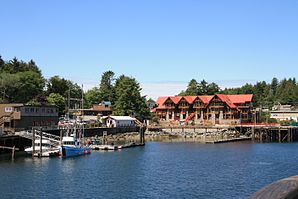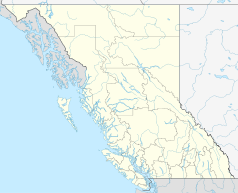Ucluelet (British Columbia)
| Ucluelet | ||
|---|---|---|
 The Inner Harbor of Ucluelet |
||
| Location in British Columbia | ||
|
|
||
| State : |
|
|
| Province : | British Columbia | |
| Regional District : | Alberni-Clayoquot | |
| Coordinates : | 48 ° 56 ′ N , 125 ° 33 ′ W | |
| Height : | 20 m | |
| Area : | 6.81 km² | |
| Residents : | 1627 (as of 2011) | |
| Population density : | 238.9 inhabitants / km² | |
| Time zone : | Pacific Time ( UTC − 8 ) | |
| Postal code : | V0R | |
 The Ucluelet ferry terminal |
||
Ucluelet is a town on the west coast of Vancouver Island , in the Canadian province of British Columbia . The settlement is located on the southern tip of the Esowista Peninsula and belongs to the Alberni-Clayoquot administrative district . The name of the place is derived from the term for a "safe haven" from the language of the Indian population, more precisely the Yu-cluth-aht , who belong to the Nuu-chah-nulth . The Anglicised version of the name of this First Nation gave the name to Ucluelet. Ucluelet was elevated to a District in 1997 .
Originally the population lived from fishing , since the 1990s ecotourism has gained in importance in the region. Special offers include whale watching tours and hikes in the primeval forests of the temperate rainforest ecosystem in Clayoquot Sound . The 20 km long, continuous stretch of beach between Ucluelet and neighboring Tofino is part of the Pacific Rim National Park as Long Beach .
The peninsula can be reached from Port Alberni , 100 km away , either via a spur road from Highway 4 or by regular ferry service . Ucluelet also has a small water airport.
history
The ancestors of today's Nuu-chah-nulth groups in the region lived here around 4,300 years ago. In the 19th century, eight tribes lived here, most of which joined today's band of the Yu-cluth-aht. Besides that, only the Toquaht , the smallest group of the Nuu-chah-nulth, still live here . Today around 190 "Aboriginals" live in Ucluelet, with a total population of 1652 (2003).
The first Europeans who came to the region were fur traders who were primarily looking for trade contacts in order to obtain the coveted otter skins . After their extinction, they hunted seals, whales and sea otters . The Europeans did not begin to settle permanently until around 1870. So Captain Francis established the first trading post in Ucluelet. Gold discoveries in Wreck Bay, today's Florencia Bay, which however did not turn out to be profitable, led to a brief gold rush. Today the Gold Mine Trail , which led into the bay, commemorates him .
The Presbyterian Church built a mission house and a school, and in 1898 the first doctor came to the village. The Canadian Pacific Railway operated a small cargo boat that ran three times a month to Victoria , the provincial capital. In 1903 a whaling station was established in Barkley Sound . There was also a lighthouse and a telegraph station . Industrial fishing began around 1914.
In the 1920s some Japanese fishing families came to Ucluelet. Around 1930 there were 60 Japanese and only 18 white families living in the village. But Japan's attack on Pearl Harbor on December 7, 1941 prompted the government to internment the Japanese, few of whom were able to return after the war had ended, as their property had since been sold. In 2008 there were again 15 Japanese people living in the village. During World War II , Canada established an aircraft base and a land base on Long Beach. For this purpose, the road to Tofino, which had been planned for more than thirty years, was built after a road to Port Alberni had been planned in the 1890s but never completed. In August 1959 the road to Port Alberni was opened.
The granting of local self-government for the community took place on February 26, 1952 ( incorporated as City ).
For a long time Ucluelet lived from the timber and fish industries, especially from salmon and tuna . Since the 1980s and especially the 1990s tourism has developed very strongly, to which the establishment of the Pacific Rim National Park contributed significantly, but also the fame of the Clayoquot Sound and the Barkley Sound . They were fiercely contested for several decades and were one of the reasons for the establishment of the environmental protection organization Greenpeace in Vancouver . In 2003 the largest employer with 250 employees was still the fish processor Robert Wholey and Co. , and International Forest Products also had more than 70 employees, but the Canadian Princess / Wickaninnish Restaurant was already the second largest employer with around 170 employees. On the other hand, the state is still an important employer, which is, however, more and more overtaken by the number of employees in the national park. In 2003 he already employed almost 60 residents of Ucluelet, leaving behind the number of teachers in the district, while the district only employed 18 people in administration. In addition, the residents are increasingly renting out parts of their house as bed and breakfasts .
In 1999, the expansion of the twelve-kilometer Wild Pacific Trail began . In 2011 it was divided into three sections, namely the Lighthouse loop , Big Beach and Brown's Beach .
A tidal power plant has not yet got beyond the planning stage.
The Westerley News is the only weekly newspaper for the Tofino-Ucluelet area.
Demographics
The census in 2011 showed a population of 1627 inhabitants for the district municipality. The city's population has increased by 9.4% compared to the 2006 census, while the population in British Columbia grew by 7.0%.
Web links
Individual evidence
- ↑ Jim Lewis, Charles Hart: Goldpanning Southwest Bc & Vancouver Island: A Prospectors Treasure Trail to Creeks of Gold , Surrey 2005, 2nd Edition, p. 80.
- ^ Origin Notes and History. Ucluelet. In: GeoBC . Retrieved August 5, 2012 .
- ↑ The official site of the trail can be found here: Wildtrail .
- ^ Ucluelet District Municipality Profile. Census 2011. In: Statistics Canada . June 6, 2012, accessed August 5, 2012 .
